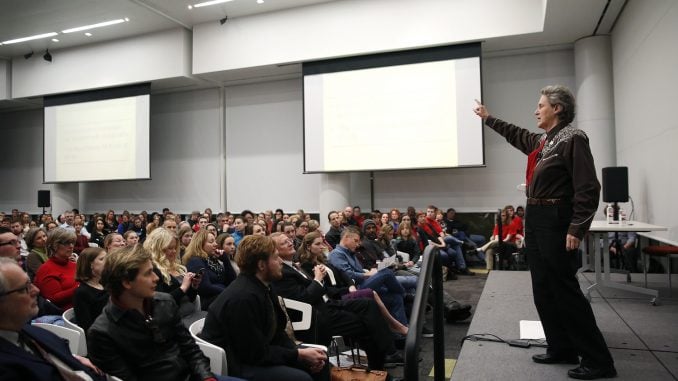
North Carolina State University welcomed Dr. Temple Grandin to a sold out crowd of over 650 people and one therapy dog at the James B. Hunt, Jr. Library on Tuesday, January 10 for her talk on how “Different Kinds of Minds Contribute to Society.” The event was co-sponsored by NCSU Libraries and the NC State Student Chapter of the American Veterinary Society of Animal Behavior.The talk drew eager students from across disciplinary studies, “One of my classes is offering extra credit, but I didn’t even realize that until today,” said Elizabeth Gordon of Raleigh.Gordon attended with her friend Sarah Long, a vet school student who chimed in enthusiastically with an explanation on the design and construction of the Grandin livestock handling system, “we’ve really been looking forward to this she’s amazing.”Dr. Grandin was introduced by Executive Vice Chancellor and Provost Dr. Warwick Arden who said, “Dr. Grandin is a designer of humane livestock handling facilities and a professor of Animal Science at Colorado State University. She has designed facilities all over the world.” Arden went on to amaze the audience with the fact that, “she has now designed get this the facilities in which half of the cattle in the United States are handled.”Grandin opened with a few words on the autism spectrum saying, “It’s a very big spectrum on one end you have Einstein who had no language until age three and at the other you have someone who can’t dress themselves.”She then transitioned to her recent visit to NASA observing that, “you wouldn’t have any moonwalk were it not for a little bit of autism, so at one end of the spectrum you have NASA scientists.” Grandin further noted, “There’s a lot of very creative people on the autism spectrum, they can be found in music, art, science.”The main topic of Grandin’s talk was on how a brain can either be more thinking or more social and emotional, citing her research on dogs in light of those traits. “For instance, the wolf is more cognitive, and the dog is more social and emotional.”Grandin wrapped up with an emphasis on the importance of reading, learning working skills, and teaching to the way in which children learn.The James B. Hunt Library regularly hosts events for students and the public to learn and enjoy within the community.



